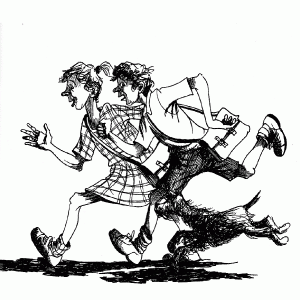By Justin James Zablocki – 2013
Since we were children we have all enjoyed the occasional riddle from one of our teachers, parents, friends, or the television. They are fun because we can either enjoy the answer to the riddle because it is funny or ironic, or we can enjoy it because we solved it or now have the ability to solve it. Whatever the case, riddles are fun for the whole family and have been a part of the human experience for millennia. But for children, riddles could mean so much more than another time-filling exercise.
If we look at riddles in a more scientific way we find out that children can benefit a lot from doing riddles. A study from the University of Sussex analysed an experiment relating the understanding and use of riddles and how it relates to text comprehension in children. It shows that children who are trained to understand and solve riddles improve markedly in text comprehension. The study also shows that children who have an appreciation of higher-level riddles have a higher comprehension of text. In this study 36 children were split into two groups, one that was trained to understand the ambiguity of riddles and solve them, and the other a control group. The group that studied riddles performed significantly higher on comprehension tests when compared to the control group. There have been several studies of this nature, all of which show positive results in favour of the use of riddles. This brings to light the fact that young children, or any child to an extent, should be exposed to riddles of various difficulties at as young an age as possible. In doing so, they will have improved reading abilities and improved problem solving skills. This can help prepare them for a more rigorous learning environment, allowing them to thrive in school rather than struggle like so many are in America’s ‘No Child Left Behind’ mentality.
Along with the ability to solve and understand riddles, the ability to create riddles is beneficial to a child’s comprehension and creativity. The same studies as mentioned prior have also tested children’s abilities to create their own riddles. One study performed at Stanford University shows positive results for the relationship between children creating puns and riddles and their creativity. For children to create their own puns and riddles they must be able to reason on a higher level than they usually do. They must be able to identify that several paths of logic can have several different meanings. These abilities translate over to other skills requiring a level of creativity and critical thinking.
Children are the future, and we have to do all we can to make sure they are equipped to succeed in a growing international marketplace. Riddles are a great way to help children improve their creativity and comprehension skills and should be included in their regular activity and learning. So why did the chicken cross the road? Go ask a child.
For some good riddles visit Good Riddles Now.
The Stanford ariticle here.
Article Source: https://EzineArticles.com/expert/Justin_James_Zablocki/1635976
